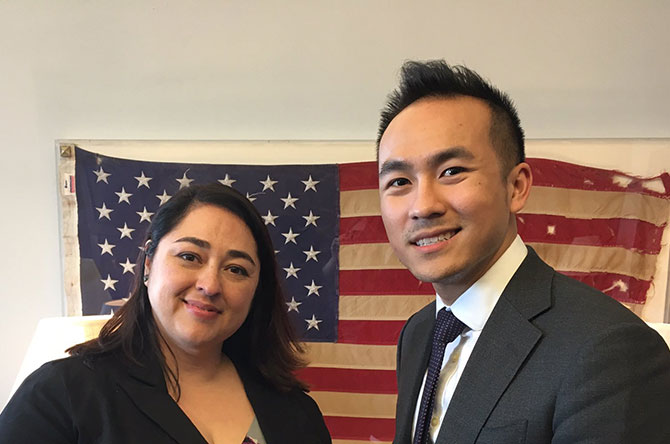Becoming a part of the National Writing Project helped me see how I wanted to shape the next steps in my career as a high school English language arts teacher working in an urban school in Phoenix, Arizona. The CAWP 2016 Invitational Summer Institute helped me find my voice as a teacher and writer. It gave me a foundation to use writing to express what matters to me in my teaching. In the months following the Summer Institute, I took the writing ideas, resources, and support from the summer and used these to fuel my teaching. I started to tap into, nurture, and exercise my authority and expertise as a teacher. I decided I wanted to work toward influencing positive change in my school and in my community, but I was not sure how.
That winter, my site director, Jessica Early, invited me to represent CAWP at the National Writing Project’s Spring Meeting and volunteer advocacy day in Washington D.C. I had never previously attended a national conference or meeting for NWP and I had no idea what this invitation entailed. I just said, “Yes!” This was the moment I began my work as an advocate for my Writing Project site and for Arizona schools and students.
Making Connections
At the NWP Spring Meeting, teachers from all over the country travel to Washington DC to spend a day speaking to members of congress and their staff advocating for funding for professional development programs that matter. It is the responsibility of the teacher-consultant or site representative to schedule the meetings in DC. I had never been politically involved before and did not know what to expect. I began by making phone calls and sending emails one month before my visit. However, before making a single phone call or clicking a single send icon, I did my research. I learned everything I could about the congressional leaders I wanted to reach. I learned about their pet projects, their campaign platforms and their mission statements. Instead of sending a generic canned email, I tailored each to the Representative or Senator I wanted to meet. For example, in one, I capitalized on the representative being from my students’ district and how, like him, most of my students are first generation college-going students.
Arizona is a politically conservative state and I knew going into this work that not all of the individuals I was contacting were necessarily on my side of the fence in terms of educational issues and funding. I did not let this get in my way. Instead, I found persistence and knowledge are the keys to getting your voice heard. I used social media to my advantage. I followed Representatives’ and Senators’ Twitter, Instagram, and Facebook pages as well as those connected to their staff pages. Then, I began to re-tweet and share anything they said that was positive about education. I did all of this before I set foot in their offices in DC and I successfully made appointments with staff members of both Arizona Senators and four House of Representatives members.
People Remember People
On the advocacy day in DC, my approach to meeting with my representatives was to tell them about myself, my students, and my work as a teacher. I shared the ways the National Writing Project has positively influenced my teaching. I kept large statistics to a minimum and asked questions. I asked about the staffer’s knowledge of writing instruction and writing research and asked them to tell me their stories. I invited staffers to stand with me for photographs to send via Twitter and Facebook to my teaching colleagues, administrators, Writing Project site, and friends. I approached advocacy as a conversation and an opportunity to make a personal connection, while also explaining the need to support the NWP.
When I returned to Arizona after the Spring Meeting, I sent emails to each congressional office one and two weeks after my visits. I sent invitations to visit my school and I also invited each representative to visit the CAWP Summer Institute. When I read that three of the representatives had signed a letter which I had asked them to sign in support of funding NWP and Arizona schools in our meetings, I sent each of them thank you notes. I keep the communication lines open and I continue to correspond with each office.
I recently shared my advocacy journey with teachers in this summer’s CAWP Summer Institute and I plan to continue my work as an advocate for Arizona schools and teachers at the local and national level through my writing, teacher-research, teaching, and work with the National Writing Project. Every NWP teacher has the power to become an advocate. Your story matters. Let it be heard.
By Monica Avila
Photo / 2017 NWP Spring Meeting
